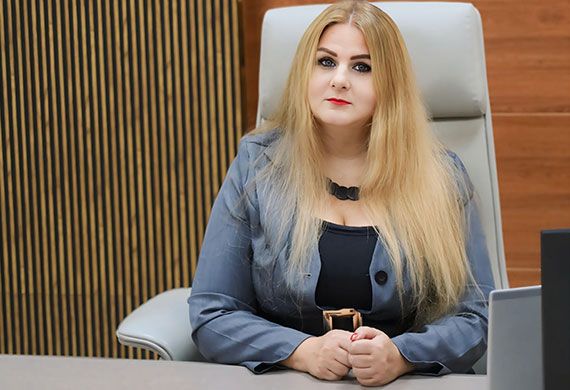Leaders

Natalia Svetenok: Inspiring Change In Education With Strategic Leadership And Innovation
Natalia Svetenok
Principal, Woodlem British School
Ajman
Women leaders in the UAE have made remarkable strides in various fields, breaking barriers and setting new standards of excellence, especially in education sector. From government positions to corporate leadership, women in the UAE are playing a pivotal role in shaping the nation’s future. The role of a school principal is crucial in shaping the academic environment and guiding the development of both students and educators. In this context, Natalia Svetenok, Principal, Woodlem British School exemplifies the impactful role of a school principal. With over 19 years of experience in education, she has demonstrated exceptional leadership at Woodlem British School. Fluent in three languages and passionate about providing quality, inclusive education, Natalia plays a vital role in shaping the school’s academic culture and fostering collaboration among educators and students.
In a personal interview, Natalia shared the different roles and responsibilities she has taken on, as well as her journey to becoming a principal.
Could you share an overview of your career in education? Additionally, what are your main areas of expertise as an educational leader?
My journey in education began in Ukraine as an English teacher and evolved into leadership roles across Saudi Arabia, Dubai, Abu Dhabi, and Ajman. I have served as Head of Department, Vice Principal, and Principal, gaining extensive expertise in educational management.
My specialisation lies in curriculum development, accreditation processes, data-driven strategies, and professional development for educators. Guided by a student-centric leadership philosophy, I focus on improving teaching quality and fostering institutional growth through innovation. Key achievements include securing AdvancED accreditation for two schools in Saudi Arabia within a year, implementing global standards-based assessments, and boosting inspection ratings for schools in Dubai and Ajman.
My ultimate aim is to create an environment where every student feels valued, empowered, & equipped to thrive in the future
Can you tell us about Woodlem British School? What are your primary roles and responsibilities as the Principal of this educational institution?
Woodlem British School is a dynamic institution known for its commitment to academic excellence, innovation, and inclusivity. With students representing over 57 nationalities, it serves as a vibrant hub of cultural diversity and ideas. As the Principal, my role involves providing strategic leadership and managing both academic and operational functions. I focus on driving curriculum innovation to align with international standards, leading teacher professional development to ensure continuous growth, and using data-driven insights to monitor and improve student performance. Additionally, I prioritize fostering a collaborative and inclusive school culture that supports student success. My ultimate aim is to create an environment where every student feels valued, empowered, and equipped to thrive in the future.
What teaching approaches or methodologies do you implement to achieve positive learning outcomes for students?
At Woodlem British School, we adopt student-centred learning methodologies designed to foster individual growth and active engagement. One of our key approaches is Project-Based Learning (PBL), where students work collaboratively on real-world challenges, encouraging them to develop problem-solving and teamwork skills. We also employ differentiated instruction, tailoring our teaching strategies to accommodate the diverse needs of our learners, including those with special educational needs, ensuring that every student receives personalised support. Technology integration plays a significant role in our classrooms, with digital tools enhancing learning experiences and encouraging critical thinking. We use Assessment for Learning (AfL) with formative assessments to guide instruction and provide feedback that supports student progress. We also integrate 21st-century skills like creativity, communication, collaboration, and critical thinking, fostering a dynamic, inclusive learning environment that drives positive outcomes for all students.
What do you consider to be the most significant challenges you face as an educator, and what strategies do you use to address these obstacles?
One of the most significant challenges is meeting the diverse needs of students while upholding high academic standards, requiring a balance between inclusivity and rigorous expectations. Another key challenge lies in keeping pace with rapid technological advancements and ensuring teachers are equipped to integrate these tools effectively. To address these obstacles, I prioritize continuous professional development (CPD) for teachers, enabling them to adapt to evolving educational demands. I also rely on data-driven approaches to identify areas for improvement and implement targeted solutions. Building strong communication with parents helps create a supportive network for students, and fostering a collaborative school culture ensures that challenges are tackled collectively.
Can you highlight the key professional milestones you've achieved in your career?
Some of the milestones I’m most proud of throughout my career include securing AdvancED accreditation for two schools in Saudi Arabia within just one year and leading The First Academy in Ajman to significantly improve its Cognia inspection rating from 2.1 to 3.13 over three years. Additionally, I achieved Cambridge and Edexcel accreditation for Woodlem British School, which allowed us to offer a comprehensive high school program. Another accomplishment I take pride in is increasing enrollment at Woodlem British School, reaching full capacity within a year.
How do you anticipate the education landscape in the UAE will evolve by 2025? Which industry trends do you believe will have a significant impact in the future?
The education landscape in the UAE is set to undergo significant transformation by 2025, driven by technology and innovation. Key trends include AI and personalized learning tools that cater to individual student needs, blended learning models combining in-person and online instruction for greater flexibility, and a stronger focus on holistic development, emphasizing creativity, emotional intelligence, and global awareness. Sustainability education will also play a crucial role, in preparing students to contribute to a greener future. As the UAE continues to lead in educational innovation, these trends will further enhance its position as a global leader in shaping the future of learning.
Natalia Svetenok, Principal, Woodlem British School
Natalia Svetenok, Principal of Woodlem British School, has over 19 years of experience in education, having held various roles from teacher to vice principal. Fluent in English, Russian, and Ukrainian, she specializes in curriculum development, teacher training, student assessment, and school improvement.
Most Viewed
- 1 Women's Health Startup HerMD Closing Doors Amid Industry Challenges
- 2 5 Famous Women in Indian Armed Forces
- 3 Saudi Women No longer Require Male Permission for Clothing Choices, says Prince MbS
- 4 Kolkata Medtech Startup Innovodigm Raises Rs 5.5 Crore Seed Funding Led by IAN Group
- 5 Yamunanagar's Kashish Kalra Honoured after Securing 111th Rank in UPSC Civil Services Exam
- 6 Madurai Appoints Its First Woman Corporation Head
- 7 IAS Vijayalakshmi Bidari Appointed as the new Nagpur Divisional Commissioner
- 8 American Entrepreneur Lucy Guo Overtakes T Swift to become Youngest Female Billionaire
- 9 ICC Women's World Cup 2025 Trophy Showcased at Indore's Holkar Stadium
- 10 Aparna Saxena's Beauty Venture AntiNorm Launches in India
- 11 Vidya Nataraj Co-Founded BlueStone Jewellery & Lifestyle files IPO
- 12 5 Women Freedom Fighters of India
- 13 Dr. G Krishnapriya appointed as CEO for Trichy
- 14 M3M & Sirona Partner to Introduce Menstrual Hygiene Vending Machines in 15 Locations
- 15 Punjab Govt launches SHE Cohort 3.0 Supporting Tech-led Women Startups
- 16 Indian origin Lawyer, Sweena Pannu appointed as the US New Superior Court Judge
- 17 The Aurora Tech Award recognizes 4 Indian Women-led Startups
- 18 Kerala's Republic Day parade featured an all-female tableau
- 19 Manisha Kabbur Becomes Karnataka's First Woman International Karate Coach
- 20 Director K. S. Ravikumar's Daughter Maalica Ravikumar Launches Life Coaching Company 'Evergrowth Academy' for Women
- 21 Leezu's Raises Pre-Seed Funding to Accelerate Growth in Sexual Wellness Industry
- 22 Sattu: Super-easy summer drink for PCOS gut healing
- 23 Swathi Nelabhatla creates Sitha App, India's First Women-Exclusive Gig Platform
- 24 7 Timeless Female Kathak Dancers & their Iconic Legacies
- 25 Meet 7 Iconic Women Architects of Modern India & their Most Impactful Work
- 26 This Woman-led Insuretech Startup is Helping Bridge the Education Financing Gap in India
- 27 Women Leaders Share Lessons Learnt from India Women's WC Win
- 28 5 Enterprising Women Founders Powering Singapore's Tech & Innovation Landscape
- 29 4 Women. 4 Stories. One Vision for Smarter, Stronger Healthcare
- 30 Global Gender Gap Narrows to 68.8%, But Full Equality 123 Years Away: WEF Report 2025
- 31 Changemakers: 7 Women Entrepreneurs Taking the Make in India Movement Forward
- 32 Meet Lucy Guo, The Youngest Self-Made Female Billionaire Disrupting Tech
- 33 How Women are Driving India's Festive Online Shopping Surge






